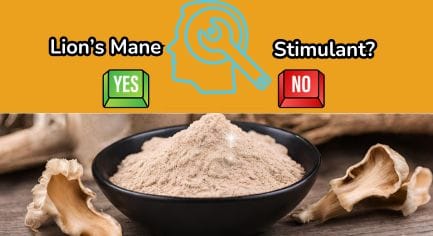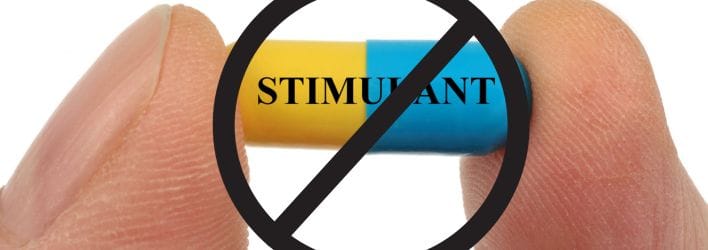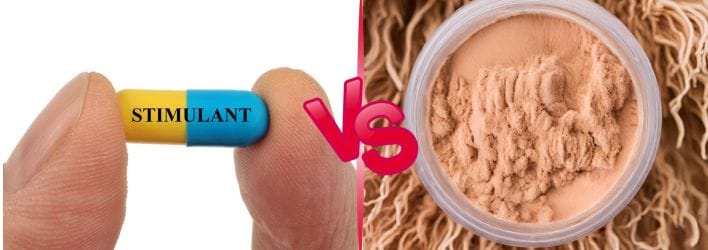Lion's mane mushrooms have been a topic of intrigue
In the realm of natural supplements, particularly concerning the impact lion's mane mushrooms have on cognitive health and potential as a natural remedy for various mental health disorders.
But a question that often arises is: Is lion's mane a stimulant? This article delves into the science behind lion's mane mushrooms, exploring their effects on the brain and body, and whether they can be classified as a stimulant.
Understanding Lion's Mane Mushrooms
Lion's mane mushrooms, also known as Hericium erinaceus, are a type of medicinal mushroom that has been used in traditional Chinese medicine for centuries. These unique fungi are known for their shaggy, mane-like appearance and have gained popularity for their potential health benefits, particularly in relation to brain health and cognitive function.

The Stimulant Debate: Classifying Lion's Mane
When discussing whether lion's mane is a stimulant, it's essential to understand what a stimulant is. Stimulants are substances that increase activity in the central nervous system, leading to heightened alertness, energy, and attention.
Common examples include caffeine and prescription medications like Adderall. Lion's mane, however, does not fit this definition as it does not induce a stimulant effect on the central nervous system.

Cognitive Enhancing Effects Without the Stimulant Properties
The cognitive enhancing effects of lion's mane are often mistaken for stimulant effects. However, lion's mane works differently. It supports the production of NGF and myelin, which are crucial for healthy brain function, but it does so without the typical stimulant-induced rush or crash.
Lion's Mane and ADHD
Attention deficit hyperactivity disorder (ADHD) is a neurodevelopmental disorder that is often treated with stimulant medication. Some individuals seek natural supplements like lion's mane as an alternative.
While lion's mane is not a stimulant, research suggests it may have beneficial effects on cognitive performance, which could be relevant for treating ADHD.

Lion's Mane vs. Traditional Stimulants
Comparing lion's mane to traditional stimulants like caffeine or Adderall is not apples-to-apples. While stimulants act quickly and have noticeable effects, lion's mane works more subtly and may take longer to notice improvements in cognitive function.
The Science Behind Lion's Mane
Human studies on lion's mane are still limited, but the existing research provides insight into how this mushroom species may impact brain chemistry.
The compounds found in lion's mane, such as hericenones and erinacines, are thought to stimulate the production of NGF, which is vital for the maintenance and growth of neurons.

Lion's Mane as a Natural Supplement for Depressive Behaviors
Lion's mane mushrooms have been gaining attention as a natural supplement that may offer relief for those experiencing depressive behaviors. Unlike traditional stimulants that can cause a range of side effects, taking lion's mane extract is associated with fewer adverse reactions and a more holistic approach to mental wellness.
Studies have shown that the bioactive compounds in lion's mane can stimulate the production of nerve growth factor (NGF), which is crucial for the maintenance and growth of neurons, potentially leading to improved mood and emotional balance.
Furthermore, the benefits of lion's mane extend beyond just mood regulation. The mushroom's ability to improve cognitive functions has been observed in both animal and human studies.
For instance, a control group receiving lion's mane mushroom extract showed significant improvements in their ability to concentrate and a reduction in anxiety and irritability, which are common symptoms associated with depressive disorders.
This positions lion's mane as a promising natural supplement for those seeking alternatives to conventional antidepressants.
Lion's Mane and Inflammation Reduction
Have you ever wondered if lion's mane medicinal mushroom could be the key to reducing inflammation?
Well, let's dive into the effects of lion's mane on our body's inflammatory responses. Studies suggest that this mushroom contains compounds that may inhibit the production of tumor necrosis factor (TNF), a substance often involved in systemic inflammation.
This could be a game-changer for those seeking natural ways to reduce symptoms of chronic inflammation.
Moreover, taking lion's mane extract regularly has been associated with lower levels of inflammation markers in the body.
his is particularly significant for individuals with conditions like arthritis or inflammatory bowel disease (IBD), where inflammation plays a central role.
By potentially modulating the immune system, lion's mane mushrooms offer a beacon of hope for many who are looking for relief from the discomfort and pain that inflammation can cause.

Lion's Mane and Daily Cognitive Support
Have you ever wondered if incorporating lion's mane mushrooms into your daily routine could offer cognitive support without the jitters of traditional stimulants? The answer lies in the unique compounds found within this medicinal mushroom.
Unlike caffeine, which can cause a spike in energy followed by a crash, lion's mane mushroom extract is believed to support brain health through more gentle, sustained means.
By promoting the production of nerve growth factor (NGF), it potentially improves cognitive function over time, making it an attractive option for those seeking a non-stimulant cognitive enhancer.
Taking lion's mane extract regularly may be akin to nourishing the brain with the nutrients it needs to perform optimally.
Many users report a subtle yet noticeable improvement in their mental clarity and focus, suggesting that the benefits of lion's mane extend beyond the temporary boost that stimulants provide.
This could be particularly beneficial for individuals looking to maintain cognitive function as they age or for those who are managing the symptoms of early Alzheimer's disease. The idea is not to stimulate, but to support and protect, which is a cornerstone of how medicinal mushrooms like lion's mane work.

Lion's Mane and Antioxidant Properties
Lion's mane mushrooms are not just a subject of interest for their cognitive benefits but also for their antioxidant properties. Antioxidants are crucial in combating oxidative stress, which is linked to a variety of chronic diseases.
Taking lion's mane extract may contribute to the body's defense against oxidative damage due to its high content of antioxidants. Studies suggest that the compounds found in lion's mane can help neutralize harmful free radicals, potentially reducing the risk of disease and supporting overall health.
Moreover, the benefits of lion's mane extend to its potential anti-aging effects, largely attributed to these antioxidant properties.
By protecting cells from oxidative stress, lion's mane medicinal mushroom could play a role in promoting longevity and preventing age-related decline.
This aspect of lion's mane is particularly appealing to those interested in natural health supplements that support a vibrant and healthy life as they age.
Lion's Mane's Influence on Gut Health
The gut-brain axis is a well-recognized concept in health science, highlighting the connection between digestive health and cognitive function. Lion's mane mushroom extract has been found to have a positive impact on gut health, which may indirectly influence brain health.
The polysaccharides in lion's mane can act as prebiotics, nourishing beneficial gut bacteria and promoting a balanced microbiome.
his, in turn, could enhance immune function and reduce inflammation, both of which are crucial for maintaining cognitive health.
In addition to its prebiotic effects, taking lion's mane extract may also help in repairing and regenerating the gut lining.
This is particularly significant because a healthy gut lining is essential for preventing leaky gut syndrome, a condition that has been linked to various autoimmune diseases and mental health disorders.
By supporting gut health, lion's mane medicinal mushroom not only contributes to digestive wellness but also to a more resilient and effective nervous system.

Lion's Mane's Synergy with Other Nootropics
When considering the effects of lion's mane on the brain, it's fascinating to explore its potential synergy with other nootropics.
Nootropics are substances that improve cognitive function, and when combined with lion's mane medicinal mushroom, the results could be even more profound.
For instance, pairing lion's mane with other natural cognitive enhancers like Ginkgo biloba or Omega-3 fatty acids might amplify the mushroom's ability to support brain health.
This is because each nootropic works in different ways to optimize mental performance, and when they come together, they could create a more comprehensive cognitive support system.
Moreover, for those taking lion's mane extract, it's worth considering the timing and combination with other supplements.
Some users find that taking lion's mane in the morning alongside their multivitamin or B-complex can set the stage for a day of enhanced mental clarity and focus.
Others may prefer to take it in the evening, as its non-stimulant nature doesn't interfere with sleep. As research into the benefits of lion's mane continues to grow, so too does the potential for these smart combinations, offering a tailored approach to cognitive enhancement that steers clear of the typical stimulant route.
Lion's Mane's Potential in Slowing Early Alzheimer's Disease
The journey to improve cognitive function in individuals with early Alzheimer's disease might just have a natural ally—lion's mane mushroom extract.
This fascinating fungus has been shown to stimulate the production of nerve growth factor (NGF), a protein that is crucial for the survival and maintenance of nerve cells.
NGF's role in brain health is so pivotal that a decrease in its levels is often linked to the progression of neurodegenerative diseases like Alzheimer's.
Incorporating lion's mane medicinal mushroom into one's diet could, therefore, offer a ray of hope for those seeking to treat ADHD or slow the progression of cognitive decline.
While it's not a cure, the potential cognitive-enhancing effects of lion's mane are hard to ignore.
By promoting NGF production and supporting neuronal health, taking lion's mane extract might just contribute to a more graceful aging of the brain, keeping the gears of the mind turning smoother for longer.
Lion's Mane and Its Role in Neurogenesis
The brain boosting properties of lion's mane medicinal mushroom are not limited to its potential in treating ADHD or reducing depressive symptoms.
Recent research has delved into how lion's mane can actually contribute to the formation of new brain cells, a process known as neurogenesis.
This is particularly significant as it suggests that lion's mane may not only improve cognitive functions but also facilitate brain repair and regeneration.
The presence of hericenones and erinacines, compounds found in lion's mane, are believed to be the catalysts for promoting NGF synthesis, which in turn supports neurogenesis.
In the context of neurodegenerative diseases such as early Alzheimer's disease, the effects of lion's mane mushroom extract could be groundbreaking.
While Adderall stimulates the brain in a way that can improve focus in the short term, lion's mane offers a more sustainable approach by potentially fostering the growth of neural pathways and enhancing long-term cognitive health.
As research continues to unfold, the implications of lion's mane in the realm of brain health are becoming increasingly promising, offering hope for a natural, supportive therapy in the fight against cognitive decline.
Lion's Mane and Nervous System Injuries
Beyond cognitive health, lion's mane has been studied for its potential to aid in the recovery of nervous system injuries. The NGF-promoting properties of lion's mane may help regenerate damaged nerve cells, offering hope for those with such injuries.

Heart Health and Lion's Mane
While the focus is often on cognitive benefits, lion's mane also offers potential health benefits for the heart. Research suggests that it may help reduce risk factors for heart disease, such as high cholesterol and blood clotting.
Lion's Mane and the Immune System
The immune system is another area where lion's mane shows promise. Its compounds have been found to have immune-modulating effects, which could be beneficial in maintaining overall health and combating illnesses.
The Anticancer Potential of Lion's Mane
Lion's mane has been researched for its potential anticancer properties. Some studies suggest that it may inhibit the growth of cancer cells, although more research is needed to fully understand its effects in this area.
How to Take Lion's Mane
Taking lion's mane can be done in various forms, including supplements, powders, coffee and teas. It's important to consult with a healthcare professional before adding lion's mane to your regimen, especially if you have pre-existing health conditions or are taking other medications.
Lion's Mane and Cognitive Behavioral Therapy
While lion's mane is not a replacement for professional treatments like cognitive behavioral therapy (CBT), it may serve as a complementary approach to managing symptoms of mental disorders and improving overall well-being.

The Future of Lion's Mane Research
More research is needed to conclusively determine the full range of benefits and potential uses of lion's mane. As interest in this medicinal mushroom grows, we can expect to see more human studies and clinical trials in the future.
Anecdotal Evidence and Personal Experiences
Anecdotal evidence suggests that individuals taking lion's mane extract report improvements in mental clarity and cognitive function. While these personal experiences are valuable, they should be considered alongside scientific research.
Traditional Chinese Medicine and Lion's Mane
In traditional Chinese medicine, lion's mane has been used for its brain-boosting properties and to treat a variety of ailments. Its history in herbal medicine adds to the interest in its modern-day applications.
Summary
Lion's mane mushrooms are not classified as stimulants but are renowned for their potential to support brain health and cognitive function.
They may help alleviate symptoms of mild cognitive impairment and other mental health disorders without the typical effects associated with stimulants.
While lion's mane offers various health benefits, more research is necessary to fully understand its impact on the central nervous system and overall health.

Q: Can lion's mane replace my stimulant medication for ADHD?
A: Lion's mane is not a stimulant and should not be used as a replacement for prescribed medication without consulting a healthcare professional.
However, it may have beneficial effects that could complement traditional ADHD treatments.
Q: What are the best Lions Mane Coffees and Powders on the Market?
"allthepeoplesay.com" has done the research on Lion's Mane Coffee and Lion's Mane Powders and compiled lists of the top recommended brands according to buyer's, along with information to make an informed purchase.
Q: How long does it take to notice the effects of lion's mane on cognitive function?
A: The effects of lion's mane on cognitive function can vary from person to person.
Some may notice improvements within a few weeks, while for others, it may take longer. Consistent use and patience are key.
Q: Is it safe to take lion's mane every day?
A: Lion's mane is generally considered safe for daily use, but it's always best to consult with a healthcare professional before starting any new supplement, especially if you have existing health conditions or are taking other medications.







